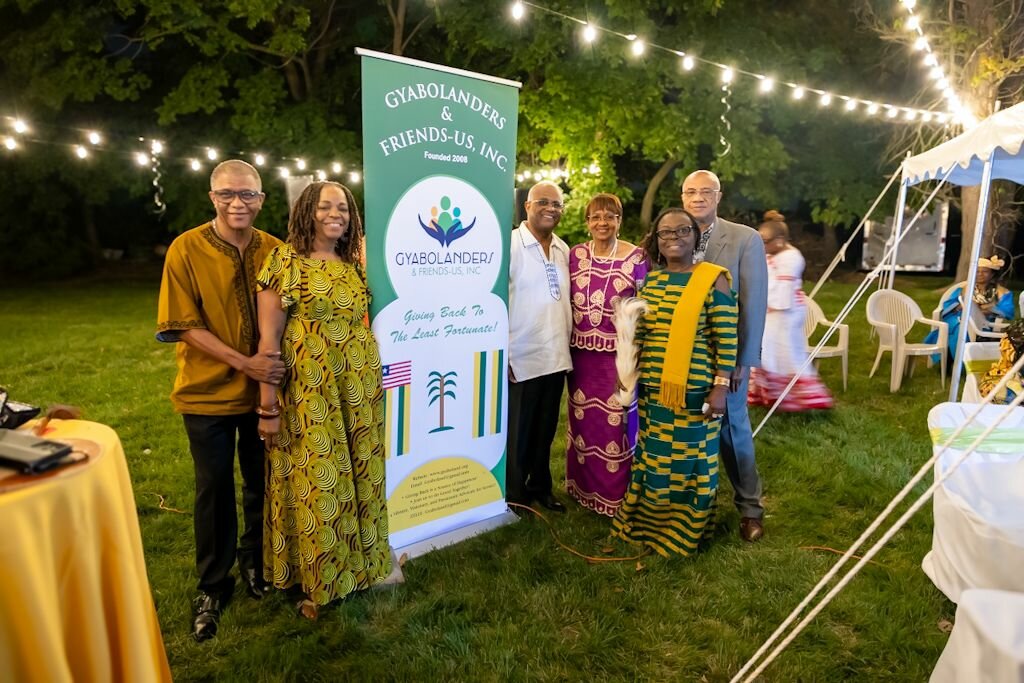Gyabolanders & Friends continues to bring hope and education to rural Liberia
In 2008, a group of transplants from Gyaboland, a region of the West African country of Liberia, who were scattered across the United States, began receiving distressing news and visual images from their homeland.
The remote area, which is largely cut off from Liberia’s infrastructure and government support, had been ravaged by the nation’s 14-year civil war.
The photographs they saw showed children attending school in dilapidated structures, struggling to learn in conditions unfit even for livestock. Heartbroken, Comfort Itoka, a member of the Freeport-Merrick Rotary and a native of Gyaboland, knew something had to be done. So she founded a nonprofit called Gyabolanders & Friends.
“The organization came into existence in 2008 when we, the descendants of Gyaboland that lived in the U.S. — very few — began to receive news from home and also images — very, very sad images — about the condition of the people of Gyaboland, most especially the children,” said Itoka, who lives in Queens.
Gyabolanders & Friends set out to help, and in the years since, it has grown from humble beginnings to a membership of about 35 individuals, and taken on numerous projects that have improved the lives of the residents of one of the most impoverished regions of Liberia. Its mission has been to address their basic needs, from education and health care to women’s empowerment and sustainable development.
Itoka, 71, was born in the region, and lived there until she was in sixth grade, when the lack of local schools forced her to move to the Liberian city of Harper so she could get an education. In Harper she lived with foster parents, until they were transferred to Monrovia, the capital city of Liberia, where Itoka attended high school.
After university in Monrovia, Itoka worked for a time before being offered a government scholarship to attend school in the U.S., which she did in 1979 at the University of Scranton before in Northeastern Pennsylvania where she studied for a year before transferring to New York University to further her studies in her specialty of Government Budgeting.
Following the completion of her studies, Itoka returned to Liberia, where she lived through the start of the Liberian Civil War. The war claimed the lives of over 250,000 Liberians, and Itoka did not escape the tragic loss that characterized the conflict, losing close family members in the violence.
Itoka was eventually able to escape the bloodshed with her family, as her four-month-old, American-born child was sick, allowing her permission to leave the country for a U.S. hospital before the fighting reached her area of Liberia. She would not return to Liberia at all for many years.
Despite her success in this country as a consultant, her heart, Itoka said, has always been with the people of Gyaboland. Beyond the need for education, she and her compatriots recognized the broader challenges the region faces. It is isolated and lacks proper roads, which makes transportation of goods and materials nearly impossible during the rainy season, from April to the end of October. As Itoka explained, “Building materials cost twice or three times as much as it will cost in the capital city, Monrovia.”
Gyabolanders & Friends, funded largely by donations, has undertaken several large-scale projects, often using local labor and resources to help boost the region’s economy. One of its most successful efforts was the construction of a seven-classroom school in Gyaboland, which was completed in 2021.
The organization also built modern restrooms and installed solar panels to provide electricity to both the school and a newly constructed women’s center in Poloyah Beach, within Liberia’s Grand Kru County, which was completed in December 2022.
The women’s center, in particular, holds great significance for the community. “The women wrote and said they had nowhere to meet,” Itoka said. “They used to meet under the trees, and so during the rainy season, they had nowhere to meet. So we were able to build a women’s center.”
In addition to the construction projects, Gyabolanders & Friends has shipped thousands of school supplies, more than 500 menstrual hygiene kits, and food to communities across Liberia. During the coronavirus pandemic, the organization distributed 10,000 locally manufactured masks and led an educational campaign to help residents protect themselves against the virus.
Despite these successes, Itoka’s group faces significant financial challenges. As Margaret Ricks, a friend of Itoka’s who also came over from Liberia and who chairs the organization’s board, explained, “The income comes from solicitation from friends and relatives. We don’t have a grant or anything. We just solicit our friends who are willing to help.”
Ricks added that Itoka herself leads most of the fundraising efforts. “Comfort is a huge fundraiser for the organization, because she knows a lot of people, and she tries to get them to donate.”
But, Itoka said, “One of our challenges as immigrants in this country is that we do not have the exposure or access to major donors to support our humanitarian work in these impoverished communities that we left behind. Therefore, fundraising is a major challenge.”
She joined the Rotary club in 2019, and it has contributed to Gyabolanders & Friends’ work in Liberia. But the need for funding is a constant, and, Itoka said, “Impoverished communities always exist, and making sustainable projects that create impact is important … this is why fundraising is a crucial part of this organization.”
For those interested in supporting Gyabolanders & Friends-US Inc., donations can be made via Zelle to Gyaboland@gmail.com, at gyaboland.org/donate, or by check to Itoka, at 121-47 238th Street, Rosedale, NY 11422.
“Helping someone you may never meet, helping someone that you don’t know — it makes me feel good,” Itoka said.






